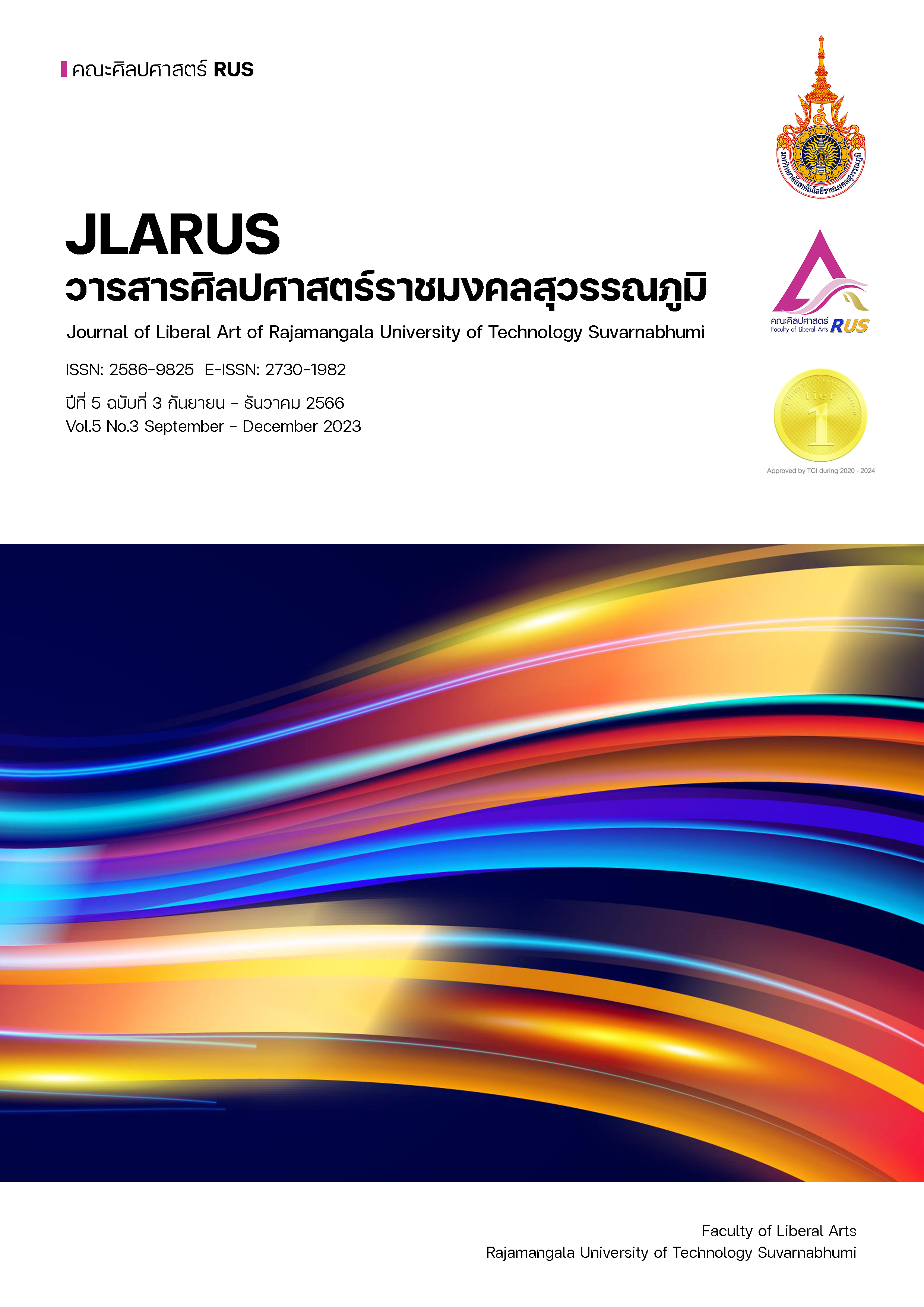THE INFLUENCE OF INDUSTRY ON THE RELATIONSHIP BETWEEN SUSTAINABILITY DISCLOSURE AND FIRM PERFORMANCE: EMPIRICAL EVIDENCE FROM LISTED COMPANIES ON THE STOCK EXCHANGE OF THAILAND
Main Article Content
Abstract
This study examined the relationship between sustainability disclosure, firm performance, and industry type. The study used quantitative research sampled from listed companies on The Stock Exchange of Thailand (SET) in 2020 and 2021. About 915 samples were collected from the sustainability reports, the annual registration statements (form 56-1 One Report), and the firm’s financial statements, including the statement of income and the statement of financial position. For measuring the level of sustainability disclosure, we used the GRI Sustainability Reporting Standards 2020 (also known as GRI Standards 2020), which comprises 37 indicators. Each indicator has a maximum score of 63, making it a suitable tool for evaluating an organization's sustainability performance. We used Linear Regression Analysis for analyzing the statistics. The research results were as follows.
1) Sustainability disclosure was positively correlated with firm performance with accounting and market performance at the statistical significance level of 0.05. 2) Industry type had a negative impact on the relationship between sustainability disclosure and market performance at the statistical significance level of 0.05. 3) Industry type did not impact the relationship between sustainability disclosure and the firm’s accounting performance. The contributions of this research are the firms realize the importance of sustainability disclosure, the stakeholders use this information for their decision, and the regulatory agencies support firms’ sustainability disclosure, including considering the influence of industry type to insetting the sustainability disclosure rule.
Article Details

This work is licensed under a Creative Commons Attribution-NonCommercial-NoDerivatives 4.0 International License.
References
ตลาดหลักทรัพย์แห่งประเทศไทย. (2560ก). GRI STANDARDS: จากรายงานสู่การจัดการธุรกิจอย่างยั่งยืน. สืบค้น 13 สิงหาคม 2565. จาก https://www.setsustainability.com/libraries/628/item/315-gri-standards.
ตลาดหลักทรัพย์แห่งประเทศไทย. (2560ข). Sustainability Disclosure: กระแสการลงทุนกับการเปิดเผยข้อมูลความยั่งยืน. สืบค้น 12 สิงหาคม 2565. จาก
https://www.setsustainability.com/libraries/660/item/23-sustainability-disclosure.
ตลาดหลักทรัพย์แห่งประเทศไทย. (2564). ตารางแสดงโครงสร้างกลุ่มอุตสาหกรรมและหมวดธุรกิจ. สืบค้น 29 สิงหาคม 2565. จาก https://www.set.or.th/th/market/index/set/industry-sector-profile.
ธกานต์ ชาติวงศ์. (2560). ทฤษฎีที่ใช้อธิบายงานวิจัยทางบัญชี: จากอดีตถึงอนาคต. วารสารวิชาการบริหารธุรกิจ สมาคมสถาบันอุดมศึกษาเอกชนแห่งประเทศไทยในพระราชูปถัมภ์ สมเด็จพระเทพรัตนราชสุดาฯ สยามบรมราชกุมารี, 6(2), 189-198.
นิตยา โยธาจันทร์, ศศิวิมล มีอำพล, และไพบูลย์ ผจงวงศ์. (2563). ความสัมพันธ์ระหว่างการเปิดเผยข้อมูลรายงานความยั่งยืนกับผลการดำเนินงานของบริษัทในกลุ่ม ESG100. วารสารบรรณศาสตร์ มศว, 13(2), 12-26.
พิศิษฐ์ อัศวบรรจงผล. (2564). ความสัมพันธ์ระหว่างการรายงานความยั่งยืนกับอัตราส่วน Tobin’s Q ของบริษัทจดทะเบียนในตลาดหลักทรัพย์แห่งประเทศไทยในกลุ่มดัชนี SET 100 (ค้นคว้าอิสระปริญญาบริหารธุรกิจมหาบัณฑิต). กรุงเทพมหานคร: มหาวิทยาลัยกรุงเทพ.
ภัณฑิรา มณีไพรัตน์. (2562). อิทธิพลระหว่างการเปิดเผยข้อมูลความรับผิดชอบต่อสังคมกับผลตอบแทนผู้ถือหุ้น: กรณีศึกษาบริษัทที่ได้รับการจัดอันดับธุรกิจด้านการพัฒนาความยั่งยืน. (บัญชีมหาบัณฑิต). สงขลา: มหาวิทยาลัยสงขลานครินทร์.
มัทนชัย สุทธิพันธุ์, ศิริวรรณ ลีลาทิวานนท์, และจิตติมา วิเชียรรักษ์. (2566). ผลกระทบของการรายงานด้านสิ่งแวดล้อมต่อผลการดำเนินงานทางการเงิน ของบริษัทจดทะเบียนในตลาดหลักทรัพย์แห่งประเทศไทยในกลุ่มอุตสาหกรรมที่ส่งผลกระทบสูงต่อสิ่งแวดล้อม. วารสารบริหารธุรกิจ, 46(178), 40-63.
วิชาวีร์ เจตะสานนท์. (2560). การศึกษาความสัมพันธ์ระหว่างการได้รับรางวัลความรับผิดชอบของธุรกิจต่อสังคมกับอัตราผลตอบแทนหุ้น กรณีศึกษา SET100 (ค้นคว้าอิสระวิทยาศาสตรมหาบัณฑิต สาขาวิชาบริหารการเงิน). กรุงเทพมหานคร: มหาวิทยาลัยธรรมศาสตร์.
Barnard, C. I. (1938). The Functions of the Executive. Cambridge, MA: Harvard University Press.
Buallay, A., Hamdan, A., & Barone, E. (2020). Sustainability reporting and firm’s performance: Comparative study between manufacturing and banking sectors. International Journal of Productivity and Performance Management. 69(3), 431-445.
Freeman, R. E., Harrison, J. S., & Wicks, A. C. (2007). Managing for stakeholder: survival, reputation and success. New Haven, CT: Yale University Press.
Kline, R. B. (2016). Principles and Practice of Structural Equation Modeling. (4th ed.). New York: The Guilford Press.
Lindblom, C. K. (1994). “Implications of Organizational Legitimacy for Corporate Social Performance and Disclosure”, Critical Perspectives on Accounting Conference, New York.
Qureshi, M. A., Kirkerud, S., Theresa, K., & Ahsan, T. (2020). The impact of sustainability (environmental, social, and governance) disclosure and board diversity on firm value: The moderating role of industry sensitivity. Business Strategy and the Environment, 29(3), 1199-1214.
Roberts, R. W. (1992). DETERMINANTS OF CORPORATE SOCIAL RESPONSIBILITY DISCLOSURE: AN APPLICATION OF STAKEHOLDER THEORY, Accounting, Organizations and Society, 17(6), 595-612.
Rovinelli, R. J., & Hambleton, R. K. (1977). On the use of content specialists in the assessment of criterion-referenced test item validity. Dutch Journal of Educational Research, 2, 49-60.
Spence, M. (1973). Job Market Signaling. The Quarterly Journal of Economics, 87(3), 355-374.
Suchman, M. C. (1995). Managing Legitimacy: Strategic and institutional approaches. Academy of Management Review, 20(3), 571-610.
Suttipun, M., & Stanton, P. (2012). Determinants of Environmental Disclosure in Thai Corporate Annual Reports. International Journal of Accounting and Financial Reporting, 2(1), 99-115.


